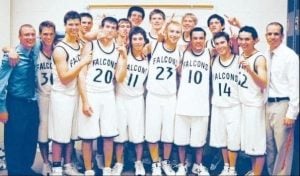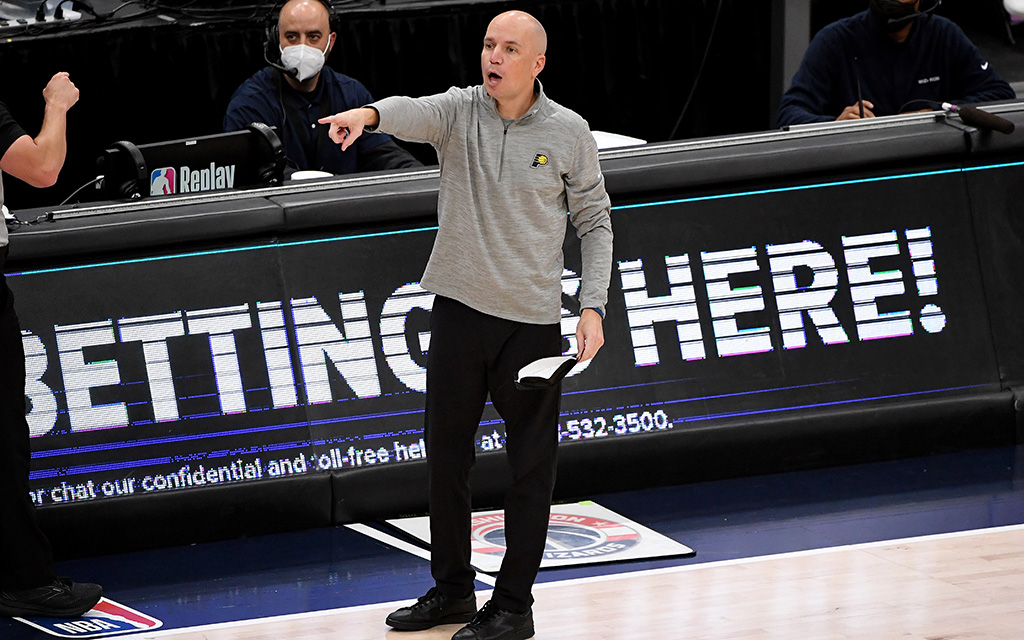PARIS – Coaching basketball has consumed Nate Bjorkgren for more than half his life, all the way from the high school ranks to the NBA. Though he secured his first coaching jobs at high schools in his home state of Iowa, it was a move to Phoenix and a position as the head coach at Cactus Shadows High School where he was able to truly establish himself.
Now he finds himself on an international stage.
Bjorkgren will serve as Team Canada associate head coach for the Paris Olympics, where his group, widely considered one of the top teams in the tournament, will face Greece in opening round action Saturday.
“I never thought I’d coach in the Olympics,” Bjorkgren said.
During his three seasons coaching high school basketball in Arizona, Bjorkgren won Regional Coach of the Year twice, was an Arizona State Coach of the Year and led the Falcons to a 4A regional title. He was able to do so with an offense that was ahead of its time.
Bjorkgren pushed the envelope with a fast-paced system where everyone on the court is able to stretch the floor and shoot, similar to the one Mike D’Antoni ran with the Suns during the same years or the ones many NBA teams currently incorporate. Bjorkgren’s teams broke multiple school records along the way for points scored and 3-pointers made en route to the 2006 4A regional championship.
“He’s really a genius. One of the smartest basketball minds I’ve spoken to,” said Arcadia High coach Kyle Diemer, a forward who played for Bjorkgren from 2004-06.
More than anything though, it was his ability to connect with players that they say made him a standout coach.
“His personality and energy, enthusiasm he brought to the gym every day, and the care he gave us outside of the floor, you know, being there for us when we needed him,” Diemer said.
Dylan DeBusk, a wing for the team during the 2006-07 season said, “He’s kind of an intense and competitive coach, but he knew how to keep things light at the right time and he knew when to say the right things.”
After a tough loss, some might expect the coach to attack the next practice like a drill sergeant. Bjorkgren, however, took a lighter approach much of the time.

Nate Bjorkgren, right, led the Cactus Shadows High School boys basketball team to a regional championship. (Photo courtesy of Dylan DeBusk)
“You might play dodgeball or you might have a really loose practice where you’re doing something totally different,” DeBusk said. “He was always (doing) something creatively and thinking in terms of how to get the team in the best mental state.”
One of the ways Bjorkgren would keep team morale high was by simply being himself. If that meant playing Gwen Stefani music during practice, quoting funny movies line or singing along to “The Badger Song,” so be it. Moments like those helped hammer home the larger point Bjorkgren was trying to make: Bonding can help a team exceed expectations. And Cactus Shadows did.
“That’s who he was,” Diemer said. “He’s super genuine, and I think we all realized that and loved him for it.”
This isn’t to say everything was always positive. Far from it. On January 26, 2006, rival Notre Dame Prep blew out Cactus Shadows 78-42. Bitter about the beatdown, Bjorkgren asked an assistant coach to take a picture of the final scoreboard and send it to him.
“I had the picture blown up, went to Walmart or something, bought a frame, and waited for the next time to play them, because that game hurt,” Bjorkgren said.
A few weeks later, it was time to play Notre Dame Prep again. In the visiting team’s locker room, Bjorkgren delivered a pregame speech. Nothing spectacular, just about different X’s and O’s. But then …
“He pulls out a framed picture, glass and all,” DeBusk recalled. Bjorkgren asked the team if they remembered that score. “And he slams the picture on the ground.”
Sort of.
“Actually, I didn’t slam it,” Bjorkgren said. “I let go of it, and it landed so perfectly that the glass just kind of shattered, and then I stomped my foot on it and everybody’s cheering.”
After that, “Everyone gets wild, we’re losing our minds and sprint out onto the court,” DeBusk said.
Two things have always remained consistent with Bjorkgren at every stop from high school to the pros: personal connections he makes, and his trusty Mountain Dew.
“A Dew a day keeps the doctor away!” Bjorkgren mused.
In foreign countries, finding the beverage can be tricky, such as when Canada won a bronze medal at the 2023 FIBA World Cup in Indonesia and the Philippines (Canada’s first medal in basketball since the 1936 Olympics). He’ll bring a few bottles of his own on trips when he anticipates it being a problem, but if he can make it through the first few days of caffeine withdrawal induced headaches, Bjorkgren said he’s normally fine.
At the end of the 2006-07 season, Bjorkgren would resign from Cactus Shadows to take a position under Nick Nurse with the then-D-League Iowa Energy. From there, he would work his way up to coaching the Dakota Wizards, Santa Cruz Warriors and Bakersfield Jam in the D-League. His next step was assistant with the Phoenix Suns before reuniting with Nick Nurse for a championship run on the Toronto Raptors in 2019, accepting a head coaching position with the Indiana Pacers for one season before returning to Toronto under Nurse again, and now serving as an assistant coach for the Portland Trail Blazers and the associate head coach for Team Canada.
“It’s a real honor to coach the Canadian national team, and how hard everybody works and what it means to have Canada written on your jersey,” Bjorkgren said. “It means a lot.”
Along the way, Bjorkgren never forgot about the players he coached in the dry Arizona desert. Diemer and DeBusk both credit his coaching all those years ago for the reason they have become basketball coaches.
“The impact he made on my life is why I wanted to get into coaching, to return that favor,” Diemer said. “We’re teaching these kids the right things off the floor, and I teach those things based on how I learned to do those things from (Bjorkgren).”
DeBusk, who has gone on to coach under Bjorkgren at multiple different stops as well as on his own, said, “I pretty much learned everything, almost everything in terms of coaching, from him. He’s the person most responsible for my career in a lot of ways, and I’m always thankful for that and for him. I’m indebted to him … and I think he knows that. He’s a very, very smart and talented coach.”
As for Bjorkgren, coaching Team Canada is beyond a dream come true, because he never imagined the heights he’s now reached when he first started coaching at Cactus Shadows.
“I did think, and had that dream to coach in the NBA, but then once I got with Team Canada, it was absolutely for the Olympics,” he said. “Now we’re one of the 12 teams that’ll be in the Olympics, and we have a really good team. We’re going to be tough to beat.”

